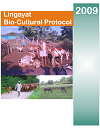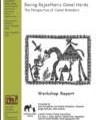Lingayat bio-cultural protocol
Sets out the bio-cultural values of the Lingayat community of Tamil Nadu, India, in the and explains how they have developed and preserved unique breeds of livestock and traditional knowledge associated with them, and how their pastoral lifestyle has developed the co-evolved ecosystem of Bargur forests which they have traditionally conserved and sustainably used. It details their customary decision making process involved in providing free prior informed consent to any actions that relate to our grazing rights, animal genetic resources and associated traditional knowledge. It illustrates the disastrous impacts that their exclusion from previously communal grazing areas and forests is having on their lives, livestock, genetic resources, traditional knowledge and the forest ecosystem itself. It articulates their forest access rights and rights over their genetic resources and associated traditional knowledge under Indian law. It p[resents a set of demands to the National Biodiversity Authority to recognize and support tyhe community in its efforts to conserve their livestock breeds, environment and lifestyle.

Download document


